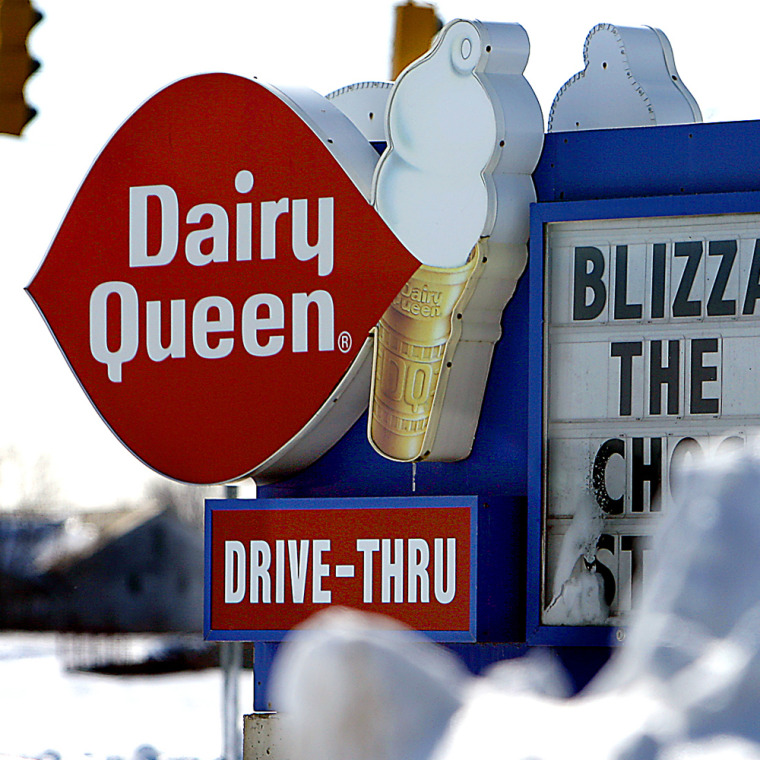Dairy Queen is facing a dilly of a problem — a rebellion against the revamping of restaurants by a growing number of mostly mom-and-pop franchise owners.
Claiming that DQ is forcing them to increase the size of restaurants or add table service under the threat of losing their franchises, owner associations with members in 10 states are now suing the chain.
Resistance to the Minneapolis-based corporation began in Michigan last month.
This month, franchisee associations with members in Arizona, West Virginia, Ohio, Virginia, Maryland, Pennsylvania, Kentucky, Missouri and Illinois filed suit to block the corporation's plans.
The lawsuit pits entrepreneurs who mostly own one or two restaurants against International Dairy Queen and its corporate parent, Berkshire Hathaway Inc., the investment company of billionaire investor Warren Buffett.
"It's the classic David vs. Goliath balance," says Carmen Caruso, an attorney for the plaintiffs.
But Dairy Queen Chief Executive Chuck Mooty says the company isn't strong-arming anyone.
"What you're hearing is the minority that really are saying, 'I really don't have any desire to evolve and rejuvenate,'" Mooty says. "We have to be a brand that's relevant."
It is the second time in recent months that a major restaurant franchise has faced rebellion in its ranks.
McDonald's Corp. late last year mixed it up with franchise owners over a requirement to offer lattes and cappuccinos. Franchise owners balked at the expense, which McDonald's estimated at up to $100,000 per store.
Dairy Queen's plans center on two relatively new restaurants lines. DQ Grill & Chill establishments would sell meals and desserts, and would expand to include limited table service, among other things. Outlets that sell only Blizzards, Dilly Bars and desserts would combine with the Orange Julius beverage chain to become a DQ/Orange Julius Treat Center.
Traditionally, Dairy Queen's have been small restaurants, often with just a few tables or even just window service.
The lawsuit contends Dairy Queen is trying to force franchise owners to spend between $275,000 and $450,000 to remodel stores to adhere to an unproven concept — one that will cost more to operate, double staffing requirements, and cut into profits.
"No one should have to make this conversion that is quite expensive unless they want to," Caruso says. "If the DQ Grill & Chill concept was such a promising new concept, then the free market would solve this problem."
That hasn't happened, according to the lawsuit.
As of December 2006, the complaint says, just 105 Grill & Chill restaurants had opened in the United States. Some have performed poorly, and two have closed.
Mooty, however, says Grill & Chill restaurants have performed well, though he declined to talk about profit margins. Mooty would only say that Dairy Queen recently finished its seventh consecutive year of higher average sales and that it has increased restaurant profitability.
"The issue is not viability," he insists.
Moreover, Mooty maintains no one is being forced to do anything. Dairy Queen does require about 70 percent of franchises to modernize restaurants periodically. But Mooty says Dairy Queen has capped the required investment at $75,000 for 2008, $85,000 next year and $95,000 in 2010. The required modernization should be no surprise to franchise owners because it's standard in most of their contracts, Mooty says.
"It is not making somebody spend hundreds of thousands," he argues. "And it is not forcing somebody to go to another concept."
Mooty said it is the franchise-owner associations, which compete with the corporation to supply the restaurants, that are stirring up trouble. Dairy Queen is cutting margins on its supply business, which is hurting the associations, he contends.
"They are losing membership, they are losing market share and they are having to take more drastic measures in creating fear and concern."
Franchise squabbles boil down to the need to please Wall Street, says consultant Richard Adams of San Diego-based Franchise Equity Group.
Chains constantly add features and items in a relentless drive to increase sales at established stores.
"The franchises become second place, second fiddle, to the investors," Adams said.
In most cases, some agreement is reached.
McDonald's agreed in December to pay franchise owners 40 percent of the cost to buck up their coffee offerings, which outside estimates put as high as $1.4 billion.
Others take it all the way to court.
"Very seldom do the franchisees win an outright victory," Adams says. "It's usually something that's settled out of court."
